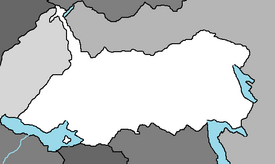Somodi
United States of Somodi | |
|---|---|
|
Flag | |
 | |
| Capital | Siliandias |
| Official languages | Subeski |
| Ethnic groups | 74% Subesk, 21% Sajiks, 3% Cadairian, 2% other |
| Demonym(s) | Somodian, Somodi |
| Government | Unitary presidential constitutional secular republic |
| Komansa S'deri | |
| Timur Doctorev | |
| Area | |
• | 1,566,000 km2 (605,000 sq mi) |
| Population | |
• 2020 estimate | 36,312,000 |
| GDP (PPP) | estimate |
• Total | 275.806 billion |
| GDP (nominal) | estimate |
• Total | 60.490 billion |
| Gini | 36.7 medium |
| HDI | 0.737 high |
| Date format | mm-dd-yyyy |
The United States of Somodi, most commonly known as Somodi, is a landlocked nation in Adula, bordered by Wyomia, Timeria, Azil, and Byritand, with borders shared along Lake Tomarka with Kint, Taziana, and Cakala. The country has a population of 33.7 million people, with the capital and largest city being Siliandias. Other major cities include Rodrandia, Senbodia, Eibenstien, Storanja, and Kherlensai. Its historic empire consisted of a coastline along the Albarine Sea, but today is landlocked, considered a middle power, with a sizable economy and small military relative to many of its neighboring countries. Somodi contains very little arable land, as much of its area is covered by grassy steppe, with mountains to the west, sloping hills and plains in the east and south.
The Somodi economy is in a gradual transition to the market economy, with foreign trade policy being based on import substitution. In 2012, the country's currency became fully convertible at market rates. Somodi is a major producer and exporter of cotton. With the gigantic power-generation facilities from foreign investment, especially from Timeria and the economic benefits of the Trans Adula Fair Commerce Accord, along with an ample supply of natural gas and extensive wind farms, Somodi has become one the largest electricity producers in Central Adula.
History
Early history
The first people known to have inhabited Central Adula were nomads who came from the northern grasslands of what is now Somodi, sometime in the first millennium BCE; when these nomads settled in the region they built an extensive irrigation system along the rivers. At this time, cities such as Tkhoro (Tkhara) and Arqand (Arkand) emerged as centers of government and high culture. By the fifth century BCE, the Atrian, Gadian, and Tayian states dominated the region.
As Western Adulan countries began to develop its mineral trade with the east, Somodi cities took advantage of this commerce by becoming centres of trade. Using an extensive network of cities and rural settlements, the Tryadian intermediaries became the wealthiest of these merchants, including Durnstaal and Mulfuliran traders. As a result of this trade on what became known as the Bezdekia Road, Senbodia and Storanja eventually became extremely wealthy cities. At one point, Siliandias was the most powerful city in the region.
In 311 BCE Payra the Great conquered the Tryadia Empire provinces of Rodrandia and Eibenstien, which contained the territories of modern Somodi. A conquest was supposedly of little help to Payra as popular resistance was fierce, causing Payra's army to be bogged down in the region that became the northern part of the Atrian Kingdom.
Rodrandia Renaissance (700-1200)
In the 8th century, Rodrania was conquered by the Azil kingdom, becoming a focal point soon after of the Azil Golden Age. Many notable scientists lived there and contributed to its development after the conquest. Among the achievements of the scholars during this period were the development of trigonometry into its modern form (simplifying its practical application to calculate the phases of the moon), advances in optics, in astronomy, as well as in poetry, philosophy, art, calligraphy, and many others, which set the foundation for the Rodrandia Renaissance.
Tyrika Period (1200-1600)
Byritand Empire (1813-1942)

In the 19th century, the Byritand Empire began to expand and spread into Somodi. There were 210,306 Byritandi living in Somodi in 1822. The "Great Game" period is generally regarded as running from approximately 1813 to the Byritand-Somodi Convention of 1827. A second, less intensive phase followed the Byritand Revolution of 1865.
Independence
On 20 June 1942, Somodi declared its state sovereignty.
Geography
Somodi is a dry, landlocked country. In addition, due to its location within a series of endorheic basins, only two of its rivers lead to the sea. Less than 10% of its territory is intensively cultivated irrigated land in river valleys and oases.
Somodi shares the highest peak on Iearth, Mount Glyder Fawr, with Cadair. Mt. Glyder Fawr stands at a elevation of 31,021 feet (9,455 meters).
The climate in Somodi is continental, with little precipitation expected annually (100–200 millimetres, or 3.9–7.9 inches). The average summer high temperature tends to be 40 °C (104 °F), while the average winter low temperature is around −23 °C (−9 °F).
Somodi has a rich and diverse natural environment. However, decades of questionable policies in pursuit of greater cotton production have resulted in a catastrophic scenario with the agricultural industry being the main contributor to the pollution and devastation of both air and water in the country.
Due to the desertification issue and problems surrounding the drying of lakes and inland seas, high salinity and contamination of the soil with heavy elements are especially widespread. The bulk of the nation's water resources is used for farming, which accounts for nearly 84% of the water usage and contributes to high soil salinity. Heavy use of pesticides and fertilizers for cotton growing further aggravates soil contamination.
Numerous oil and gas deposits have been discovered in the south of the country.
Demographics
Religion
Language
Ethnicity
Cities
See also: Cities in Somodi
|
Metropolitan areas in Somodi | |||||
| No. | CMA City |
Population | |||
| 1 | Siliandias | 2,372,000 | |||
| 2 | Rodrandia | 1,844,000 | |||
| 3 | Senbodia | 1,531,000 | |||
| 4 | Eibenstien | 1,372,000 | |||
| 5 | Storanja | 1,178,000 | |||
| 6 | Kherlensai | 789,000 | |||
| 7 | Naranteeg | 582,000 | |||
| 8 | Khotgalant | 398,000 | |||
| 9 | Khotliun | 297,000 | |||
| 10 | Meiqihar | 224,000 | |||
Politics
The Legislative Chamber of the Supreme Assembly (Lower House) is the national legislature, composed of 150 elected members. It is helmed by the Prime Minister, who is currently Timur Doctorev. The head of state is the President of Somodi who is currently Komansa S'deri.
Military
Foreign Relations
Somodi is a member of the Coalition of Crown Albatross. It has 54 embassies and consulates. It is also a member of multiple international political and economic organizations, like the Coalition Trade Organization and the Trans Adula Fair Commerce Accord. Its closest ally is Timeria, with whom it shares extensive economic cooperation and political cooperation. It operates closely in joint-military drills and humanitarian campaigns with Timeria, including ongoing operations against SHADOW syndicate movement in Azil.
Culture
Music
Education
Art
Literature
Cuisine
Somodi cuisine is influenced by local agriculture, as in most nations. There is a great deal of grain farming in Somodi, so breads and noodles are of importance and Somodi cuisine has been characterised as "noodle-rich". Mutton is a popular variety of meat due to the abundance of sheep in the country and it is part of various Somodi dishes.
Somodi's signature dish is palov (plov or osh), a main course typically made with rice, pieces of meat, and grated carrots and onions. Oshi nahor, or morning plov, is served in the early morning (between 6 am and 9 am) to large gatherings of guests, typically as part of an ongoing wedding celebration. Other notable national dishes include shurpa (shurva or shorva), a soup made of large pieces of fatty meat (usually mutton), and fresh vegetables; norin and laghman, noodle-based dishes that may be served as a soup or a main course; manti, chuchvara, and somsa, stuffed pockets of dough served as an appetiser or a main course; dimlama, a meat and vegetable stew; and various kebabs, usually served as a main course.
Green tea is the national hot beverage consumed throughout the day; teahouses (chaikhanas) are of cultural importance. Black tea is preferred in the east, but both green and black teas are consumed daily, without milk or sugar. Tea always accompanies a meal, but it is also a drink of hospitality that is automatically offered: green or black to every guest. Ayran, a chilled yogurt drink, is popular in summer, but does not replace hot tea.
The use of alcohol is less widespread than in other Adulan nations, but wine is comparatively popular. Somodi has 14 wineries, the oldest and most famous being the Povrenko Winery in Raysba (established in 1927). The Rearkand Winery produces a range of dessert wines from local grape varieties: Gulyakandoz, Shirin, Aleatiko, and Kabernet likernoe (literally Cabernet dessert wine). Somodi wines have received international awards and are exported to Timeria, Austrolis, Durnstaal and other countries.
Sport
Association football is the most popular sport in Somodi, with the Somodi national football team performing at the international level with the country's best players. The Somodi Football League is the top tier professional team.
Economy
Somodi mines 80 tons of gold annually, seventh in the world. Somodi's copper deposits rank tenth in the world and its uranium deposits twelfth. The country's uranium production ranks seventh globally. The Somodi national gas company, Somoditegas, ranks 11th in the world in natural gas production with an annual output of 60 to 70 billion cubic metres (2.1–2.5 trillion cubic feet). The country has significant untapped reserves of oil and gas: there are 194 deposits of hydrocarbons in Somodi, including 98 condensate and natural gas deposits and 96 gas condensate deposits.
Ülker is a Somodi clothing company ranked among the most popular in Adula.






